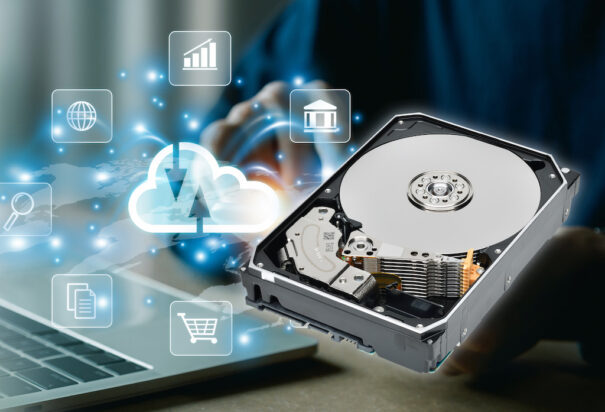Toshiba claims that hard drives will dominate the storage market in 2023
Against the forecasts placed by solid-state drives (SDD) At the forefront of the market, Toshiba Electronics Europe emphasizes that hard drives (HDD) will continue to lead the storage sector, both cost and capacity.
The price per unit of capacity of SDDs is still approximately four times higher than that of HDDs: in terms of cost, the storage capacity of 2 TB on hard disk equals 500 GB on SSD, as they point out from Toshiba Electronics Europe.
During the present 2023, Hard drives will continue to lead the storage market, mainly due to the Capacity unit cost that offers this technology and against the forecasts of analysts, that augured the supremacy of solid-state drives.
The reality is that HDDs are still the most attractive storage devices for a wide range of tasks., according to Toshiba Electronics Europe, as there are several reasons why the 'omen' for SDDs has not been fulfilled.
Among others, the Japanese manufacturer emphasizes that the amount of SDD produced could not meet the market demand before the Exponential growth of data volumess. In addition, SSD memory is not inexpensive enough to address many of the applications that require large-scale data storage.
At the same time, HDD storage technology remains competitive thanks to the Engineering developments incorporated into hard drives, such as the use of helium or improvements to read and write heads.
Specifically, Helium has made it possible to reduce friction between the discs when rotating inside the housing, so that it is now possible to incorporate more disks into a drive and thus increase storage capacity.
In this sense, The company gives as an example the MG10 series, that Toshiba presented to the market in October 2022 and includes enterprise-capacity 3.5" hard drives with ten platters, that offer a Ability to 20 Tb, which is expected to increase to 22 TB and 24TB in the near future.
Market trends
While many laptops and smartphones have replaced the use of HDDs with SSDs, mainly by devices with compact M.2 format and NVM-e interface, its price continues to almost quadruple that of HDDs.
In terms of cost, the storage capacity of 2 TB on hard disk equals 500 GB on SSD. This is why budget PCs with higher memory requirements still use HDDs.
The increase in Online storage is another challenge facing the industry. It is necessary to have Large Data Centers that use hard drives as their primary solution. In these environments, although individual HDDs offer slower processing than SSDs, The interconnection of a large number of hard drives allows relatively high speeds to be achieved.
In fact, Configurations with sixty or more disks in a host-managed drive that can process high volumes of data are already in place, with an overall performance of almost 17 GB/sec, as long as the bottleneck can be overcome.
With the PCI-Express Gen4 technology can reach almost 16 GB/s on all eight host interface lines. To achieve greater increases, Another possibility is the PCI-Express Gen4 adapter cards, with sixteen lines with a limit of, Approximately, 31 GB/s, which is more than enough even in configurations that incorporate a hundred HDDs.
Another key trend in the storage market is Sustainability and reliability Data Center operations (Cpd), in which HDDs also play an important role.
 Toshiba has conducted extensive testing that certifies that CPDs can deploy enterprise-capable hard drives, In high-density JBOD solutions of partners, to meet high data storage needs and, at the same time, Comply with the energy efficiency requirements set out in the roadmap of this sector.
Toshiba has conducted extensive testing that certifies that CPDs can deploy enterprise-capable hard drives, In high-density JBOD solutions of partners, to meet high data storage needs and, at the same time, Comply with the energy efficiency requirements set out in the roadmap of this sector.
The Video surveillance is another environment where HDDs play with an advantage, as installations increasingly have a greater number of high-resolution cameras and require new generation HDD solutions, able to withstand the High-definition video streaming in harsh and operational environments 24/7.
To these requirements is also added the demand of the security industry to have reliable solutions that offer the Lower total cost of ownership (Tco) possible.
The S300 and S300 Pro series of Toshiba cover these specific requirements (more data in Digital Security) and have already proven their effectiveness in video surveillance environments, with positive acceptance in customers worldwide.
These units, Designed to withstand Until 64 High-definition video inputs and operate in a temperature range of 0 at 70oC, It also responds to another demand: Reducing energy consumption, both from the point of view of operating expenses and sustainability.
With a rotational speed between 5.400 And 5.700 .RPM, Using S300 drives significantly reduces the amount of power consumed during recording. In the case of MG series of enterprise hard drives, that uses helium and is targeted at Surveillance analytics with artificial intelligence (The), Less friction allows energy to be consumed efficiently speeds of 7.200 .RPM.
For all these reasons., Toshiba notes that the HDD storage market is not losing speed and, Given the growing demand for capacity and the new possibilities opened up by engineering advances, The company continues to invest to increase its production and continues to collaborate with suppliers of data center equipment, video surveillance system integrators and OEM manufacturers.
You liked this article?
Subscribe to our RSS feed And you won't miss anything.



